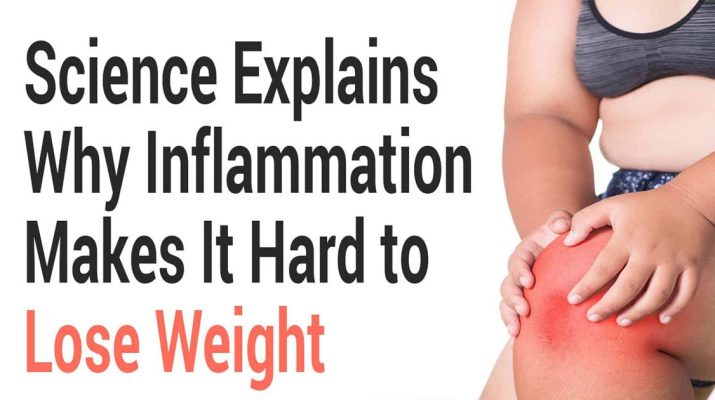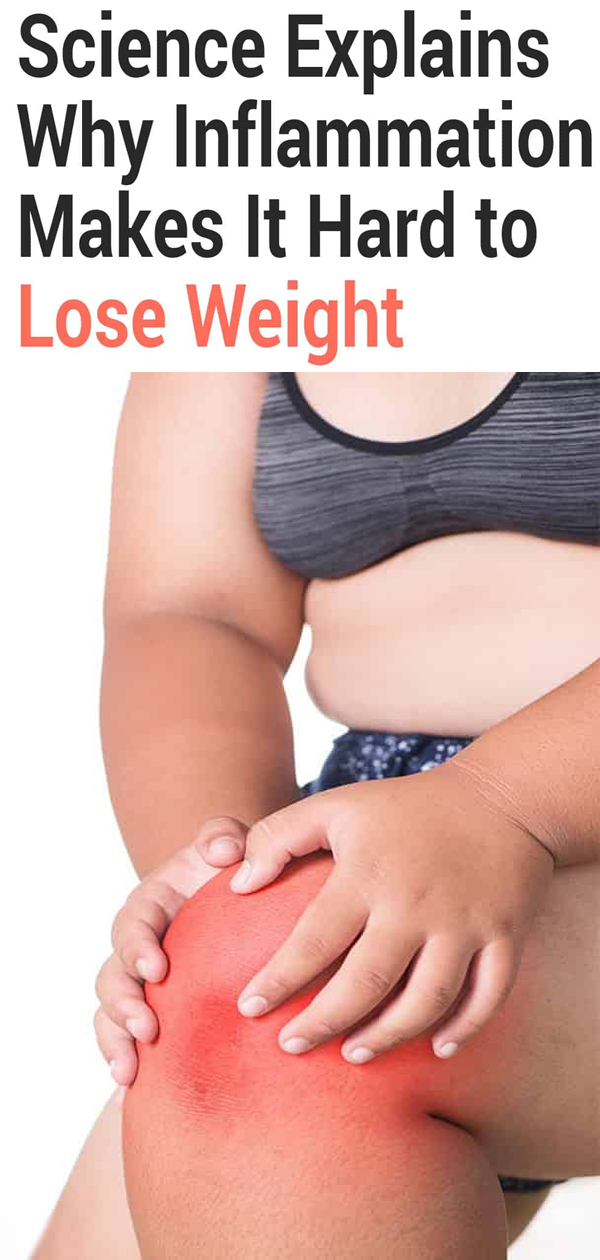Have you been trying to lose weight for a while, but to no avail? Are you counting calories carefully, giving up unhealthy foods, and exercising regularly, but still find yourself unable to lose weight? It’s an incredibly frustrating cycle – but there may be a reason!
Inflammation could be caused by many common diet habits, as well as many common bad habits that go unnoticed. You might already know this fact. What you might not know is that inflammation can also cause you to retain or even gain weight. With all the misinformation on weight loss present online, it’s easy to accidentally perform incorrect activities and stall your weight-loss progress.
Worse still, continuing these habits can teach your body repeated weight-gaining processes, making long-term patterns of weight gain more likely to occur. This is why you have to take steps in order to prevent inflammation from taking over your body.
But why does something like inflammation affect your weight? Are you inflamed? What habits do you need to stop, and what habits can reduce it entirely? Here’s how science explains why inflammation makes it hard to lose weight – and what you can do about it.
Why Inflammation Makes It Hard To Lose Weight, According To Science
1. WHAT IS INFLAMMATION?
Inflammation is an immune system response. In simple terms, it happens when blood flow needs to rush to a specific injured or infected area in order to bring more white blood cells to the location. This causes the dilation of the blood vessels in the area, which may show up to you as warmth or feverishness, redness, pain, and even swelling.
It sounds bad, but when necessary, inflammation is actually a positive, life-saving process. It heals wounds and infections, preventing fatalities from simple cuts and scratches, and you’ve probably noticed it happening when you get sick or injured.
This type of inflammation is called acute inflammation. When it occurs, the tissue that needs attention releases a bunch of transmitting chemicals known as cytokines, which inform the body that something is wrong and kick the immune system into gear to fix it.
Fevers and intense pain can be a part of acute inflammation. This is due to prostaglandins, which are components that help the blood to clot. The fever and pain are just a side-effect of healing, and they go away when recovery is far along enough.
2. Why Does Inflammation Make It Hard To Lose Weight?
But what happens when inflammation stretches out and is present on a more long-term basis? That’s when the problems start to pile up, as prolonged, chronic inflammation can be detrimental to your health in many, many ways – and it can be the starting point for obesity.
There are a variety of things that can cause inflammation, ranging from bad habits to ones touted as good. At the end of the day, this constant inflammation activates hormones within the body that store fat. These hormones are:
A) Leptin
Leptin is a hormone that helps regulate hunger, making you feel sated and full after a meal for a decent amount of time. It controls the appetite, balances your metabolism, and keeps the body’s fat in check.
When you have chronic, long-term inflammation, your body may become leptin-resistant. This means you will no longer be able to tell with good accuracy when your body is no longer hungry. This will often result in overeating.
B) Insulin
Insulin is the hormone responsible for blood glucose control, and you likely hear about it most in relation to diabetes. Inflammation can cause insulin resistance, which, in turn, leads to unstable blood sugar levels.
Glucose crashes and spikes can be harmful to your health, as they cause your body to feel hungry during crashes and may even eventually lead to the development of diabetes.
C) Cortisol
Cortisol is the body’s stress neurotransmitter. This hormone is released by parts of the body known as adrenal glands. Short pushes of cortisol are great for promoting weight loss and managing inflammation, as they are produced during times of stress.
The issue is that these glands can’t tell the difference between stress types, whether physical, psychological, or complete false alarms. Inflammation can trigger a bodily stress response, causing you to feel more stressed out, affecting your positive thinking and potentially leading to increased feelings of hunger.
Inflammation is something that must be combatted. It is a sign of bad lifestyle choices and can lead to multiple health-related issues – especially related to weight gain, heart disease, and similar problems. If your goal is truly to lose weight, you’ll need to get rid of everything that causes constant inflammatory stress.
3. What Causes Inflammation?
On a biological level, inflammation occurs when the body responds to infection or injury, with the process occurring like this:
- Step 1: Your arteries expand in order to rush blood to certain areas, mainly injured ones. This increases the amount of blood flowing through the area.
- Step 2: Your blood capillaries widen, allowing proteins and fluids to enter them more easily, thus allowing them to move from the blood to the cells and back again.
- Step 3: The body produces white blood cells known as neutrophils. Neutrophils are packed with little sacs which contain microorganisms used for digestion, especially enzymes.
So, what causes inflammation to occur on a chronic level, where it stops being positive? There are several possible causes, including:
- Obesity
- Lack of sleep
- Chronic stress
- Processed foods
- Overeating
- High blood glucose levels
- High blood pressure
- Bacterial contamination of food and water
- Irritant-exposure over long periods of time (such as exposure to pollution or chemicals)
- Allergen exposure
- Smoking
- Excessive alcohol consumption
- Untreated injuries and inflammation
- Autoimmune disorders
- Endocrine disorders
4. Questions To Consider For Symptoms Of Inflammation
More people are experiencing inflammation than you may believe. If you’re wondering if you’re one of them, and if it’s causing you to be unable to shed extra pounds, you’ll want to be able to recognize the signs that it’s happening. Here are some questions to ask yourself to determine if you are experiencing symptoms of inflammation or are at risk.
- Do you have allergies?
- Is your BMI over 26 (or are you overweight or obese)?
- Do you experience feelings of sluggishness or sleepiness after having a meal?
- Do you get headaches, brain fog, or some form of congestion after having a meal?
- Have you been facing issues with phlegm and mucus?
- Do you face moderate or severe stress regularly?
- Are you active in performing cardio workouts twice weekly or more frequently, for longer than half an hour each time?
- Do you have blood glucose problems, such as insulin resistance or diabetes?
- Does your medical history indicate a lot of chronic conditions, such as sinus infections, cold and canker sores, and the flu?
- Do you deal with digestive troubles, such as irritable bowel syndrome, diarrhea or constipation, or colitis?
- Do you consume alcoholic drinks regularly (over 3 or 4 drinks weekly)?
- How much exercise do you get? Is it less than 2 hours weekly?
- Do you experience joint pain or arthritis?
- Are you often around heavy metals, toxins, pesticides, or other similar products?
- Do you have skin problems such as acne, eczema, or psoriasis?
While these questions on their own don’t necessarily point to inflammation, the fact remains that these can all be symptoms of this problem? If you find yourself saying “yes” to a good number of these questions – or at least three – then you are likely at a high risk of inflammation, or already inflamed, to begin with.
5. How To Reduce Inflammation
Getting healthy is the best way to reduce inflammation – but that’s easier said than done. Don’t worry, though, and keep your positive thinking cap on! Research has made it clear what can be done to curb this problem. Here are some steps you can and should take to reduce inflammation.
A) Cut Out Inflammatory Foods
Inflammatory foods cause your body’s levels of inflammation to jump right up – just as the term for them suggests. They can cause the buildup of stubborn fat that is difficult to work off. As such, you should avoid – or consume less of – foods like:
- Sugar
- Alcohol
- Processed meats
- Unsaturated vegetable and seed oils
- Artificial trans fat
- Soy
- High-fructose corn syrup
- Refined carbohydrates
B) Start Eating Food That Are Anti-Inflammatory
Certain foods can actually reduce inflammation within the body. They can also bring your metabolism up to speed, and they can be powerful tools for health-boosting purposes. Here are some that you likely want to add to your diet.
I. Proteins
These build your lean muscle, and they can help to reduce the negative effects that come from fat cells, especially towards hormones.
II. Vegetables And Fruits
These are always safe bets. Additionally, they come packed with positive nutrients like vitamins, antioxidants, and bioflavonoids.
III. Whole Grains
Though they can sometimes contribute to inflammation, if you do need to eat carbs, whole ones are the best to opt for.
IV. Healthy Fats
Believe it or not, health can be good for you! Go for monounsaturated and polyunsaturated heart-healthy fats like fish, nuts, eggs, avocados, and more.
C) Exercise Intelligently
Some exercises stimulate higher levels of cortisol production in the body, and some can cause excessive catabolism of the muscles. Basically, if you exercise incorrectly, you might just cause inflammation.
You’ll want to do exercises that help stimulate adrenaline and other hormones that burn fat. Your best bet is a metabolic workout, which focuses on burning calories during the session and keeping up the fat-burning progress throughout the day.
D) Make Sure You Have Your Macros Right
Macros, or macronutrients, refer to carbohydrates, proteins, and fats. Essentially, you need the right balance of all of these components in order to prevent inflammation, keep your blood sugar stable, have positive hormone activity, and enjoy good digestive function.
You need to learn to balance these nutrients and get them in the right amounts for your body for the best results. How many carbs do you need in a day? How about fats and proteins? Figure out exactly what you need and how much of it.
Final Thoughts On Why Inflammation Makes It Hard To Lose Weight
The key to losing weight may lie in curbing inflammation first. By recognizing symptoms of this problem, you can start to take steps to overcome it. Improving your overall lifestyle through a healthy diet, smart exercise techniques, and being more aware of what you consume is more than enough to cause inflammation to die down in just three weeks.
More importantly, stop participating in fad diets. Stop doing inflammatory exercises. And, of course, don’t let yourself get caught up in negativity when your weight loss journey hits a few hurdles. Losing weight is a difficult process, but it’s worth it – and it’s worth fighting inflammation for.


